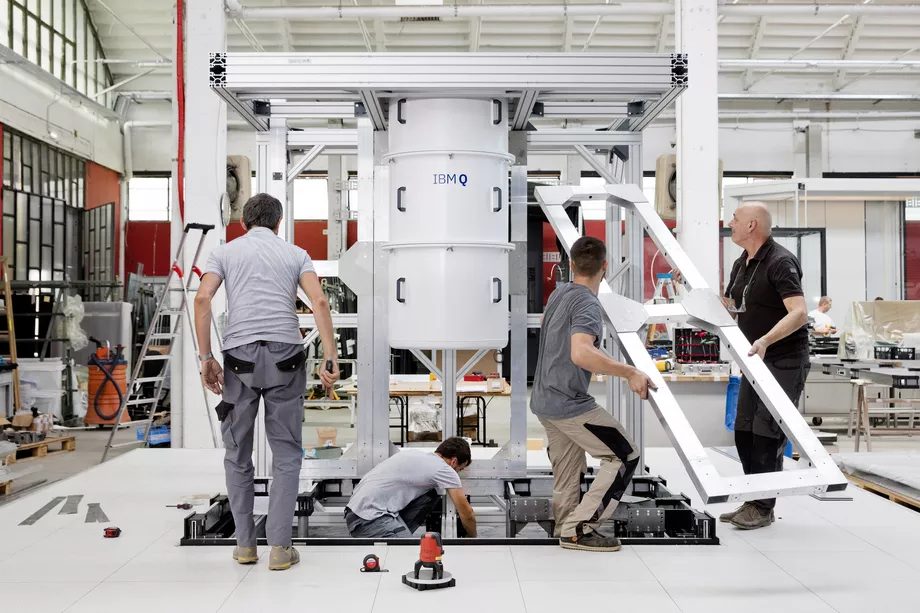IBM Rolls Out Its First Quantum Computer, Crypto Industry to be Disrupted?
CoinSpeaker
IBM Rolls Out Its First Quantum Computer, Crypto Industry to be Disrupted?
While many of us might have heard about quantum computers, so far its scope was limited to researchers, scientists and engineers. Breaking the ice, IBM unveiled the world’s first quantum computer called Q System One for commercial use. Furthermore, IBM also plans to open the first “IBM Q Quantum Computation Center for commercial clients” this year.
The IBM Q System machine will tackle extremely complex problems which are beyond the scope of classical computers. Director of IBM Research, Arvind Krishna, said:
“The IBM Q System One is a major step forward in the commercialization of quantum computing. This new system is critical in expanding quantum computing beyond the walls of the research lab as we work to develop practical quantum applications for business and science.”
However, Quantum Computers do come with the operating challenges. The Quantum computing chips need to be kept at the properly regulated environment. Furthermore, extreme care is essential for its stability. Even the slightest electrical fluctuations or physical vibrations can cause quantum computations to go haywire.
However, a quantum computer has significant advantages and can process exponentially much more data than traditional computers. Quantum Computing is all about using Quantum bits also called qubits. Normal computers process data in binary bits like zero and one. Qubits take a value between 0 and 1 through a quantum phenomenon called as superposition. Below is a brief video to understand Quantum Computing.
Something Special About the Q System One
IBM calls its success with the Q System One as turning down an experimental quantum computer into a ‘close-to’ mainframe computer with better stability. The industrial design consultancy – Map Project Office is the name behind Q System One’s design. All the components in the Q System One are isolated very carefully in order to limit vibrations.
IBM has thus ensured that it the machine is reliable for commercial use. To get an idea of how IBM makes it Q System machines, take a look at the picture below.

While speaking to The Verge, IBM’s VP of quantum research, Bob Sutor said:
“This is something IBM brings to the market that no one else really does. We know how to do integrated systems. The electronics for a quantum computer are not something you go buy off the shelf. You need a temperature controlled environment, you need to minimize the vibrations — anything that might disrupt the quantum calculations.”
Sutor also adds that the practical advantage of Q System One is that it significantly reduces research downtime. Winfried Hensinger, professor of quantum technologies at the UK’s University of Sussex, said:
“It (Q System One) more like a stepping stone than a practical quantum computer. Don’t think of this as a quantum computer that can solve all of the problems quantum computing is known for. Think of it as a prototype machine that allows you to test and further develop some of the programming that might be useful in the future.”
Quantum Computing Posing a Threat to Crypto Industry
Well, some experts argue that quantum computing can pose a potential threat to the crypto and blockchain industry. Researchers argue that Quantum computations are powerful enough to break into the blockchain code or the public key cryptographic code. IT means that quantum computing directly attacks at the heart of the blockchain technology.
The highly-encrypted cryptographic codes make blockchain much powerful and tamper-proof providing ultimate security for its users. Breaking into this means forging the digital signatures of all items on the distributed ledger. This potentially opens the door for 51% attacks as recently seen in Bitcoin Cash and Ethereum Classic.
Talking to the Gizmodo publication two months back, Alexander Lvovsky, an experimental physicist at the University of Oxford, said:
“Quantum computers pose a risk to any kind of security where public key cryptography is involved. However, blockchains are especially at risk, because they’re completely anonymous. They’re only protected by public key cryptography, whereas banking has human tellers, plastic cards, and ATMs. You have to be a human to use a bank, but you don’t have to be human to use the blockchain.”
Note that quantum computing is still pretty much in its early stage of development, but it is certainly ringing some alarm bells.
“Much like today’s [quantum computing] hardware is not mature, algorithms that could threaten cryptography in the near term are not mature, but advancing rapidly,” said Nick Farina, CEO of startup EeroQ Quantum Hardware.
“The solution is not to panic, but to follow developments on both sides of quantum computing closely and look into post-quantum security a little bit sooner than you currently are planning to,” adds Farina.
IBM Rolls Out Its First Quantum Computer, Crypto Industry to be Disrupted?